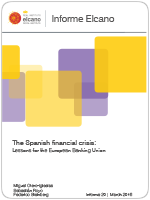In the first years of the Global Financial Crisis, Spanish financial institutions were not as severely affected as those of other countries. However, their apparent success was short-lived. As the crisis intensified, Spain’s banking sector could not escape its dramatic effects. Our analysis of the Spanish crisis confirms a long-standing tenet: financial systems collapse when they take on too much risk and when they do not have sufficient capital in reserve to absorb the losses of their risky investments and loans.
This report examines the Spanish banking crisis and uses it to extract valuable lessons for the construction of the European Banking Union (EBU), which is a complex process that resembles in some respects the variety of actors and preferences encountered in the Spanish case.


